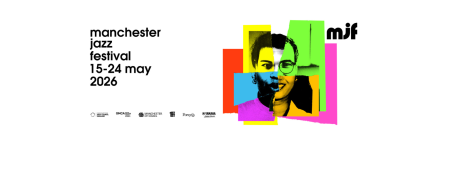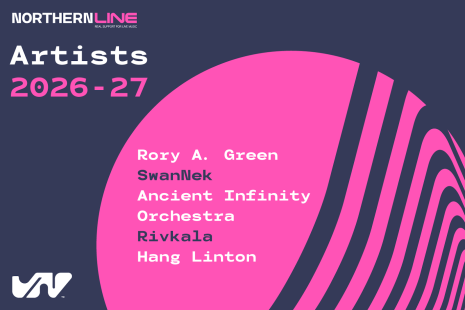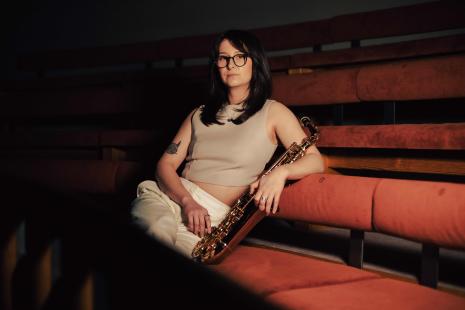

Interview with Sunna Gunnlaugs, made at the European Jazz Conference 2016 in Wroclaw. Since two years Sunna is in the organising Board of Reykjavik jazz Festival, the main jazz event in Iceland.
How did the story of Reykjavik festival started?
In May 1990 it was Iceland's turn to host the Nordic Radio Jazz Days, organised by the public radio. The Festival was a great success and it became obvious that it was here to stay. So the following year the city of Reykjavik and the musician's union joined the public radio in Iceland in organising the event, called “Rurek Jazz Festival” (the name was a combination of letters from the public radio RUV and Reykjavik). The public radio withdrew in 1997 and the musician’s union took over the Festival with the support from the city and the name changed to “Reykjavik Jazz Festival”. It was organised in the autumn, the season when airline tickets to bring in the artists are cheaper. At a certain point it moved to August, to attract more tourists to the concerts. Nowadays it is still organised by the musicians, who decide what to change and in which direction it has to go.
When did you start to get involved with the Festival?
As a musician I played on it several times. Then two years ago, when Petur Gretarsson suddenly retired from directing the Festival after 8 years, I got on the Board with two other people, Leifur Gunnarsson and Ari Danielsson, to continue the work of Petur. Ari withdrew from the Board early this year which left me and Leifur in charge.
What is the format of the Reykjavik Jazz festival?
We start on the Wednesday and end on the Sunday. It has about 30 events overall, including concerts, master classes, happy hour events, jam sessions, with no overlapping events. The focus of the Festival is very much on the Icelandic jazz scene. We really want to support the scene here, and this also means inspiring and invigorating it by bringing in the best groups on the international scene. We encourage as well collaborations between Icelandic and international artists.
How many people do you have working there?
We don’t have any full time staff. We have volunteers during the festival, and the Board organises everything during the year. Everybody tries to help out. Quite a few people that sign up to be volunteers are visiting Iceland, for example to study. It is surprising to see all these young people that want to be a part of the festival. This year I also called some of my music students, and they were really enthusiastic about it. Some of them never attended it before, and their families came in the next days because their son told them that it was really good. It turned out to be a kind of audience development!
In which venues does the festival take place?
It used to be spread all around the city. Then after we got Harpa Concert Hall we gradually moved all events in there. It is in a gorgeous area in the centre of the city, by the water. The musicians really like that they can see each other's performances and interact between shows. It creates a special atmosphere when the audience is moving between concert halls and you feel the whole building buzzing with excitement. We mainly use two concert halls, one of around 550 seats, the other of around 250. There is also a bigger one that we might use in the future if we will bring in acts with a wider appeal. We have happy hours and family-oriented concerts during the day and jam sessions at night, all in open spaces of the building. Those are free concerts, so people and tourists that are passing by the venue will see the jazz festival in full swing, and possibly get into it.
Who comes to the concerts at Reykjavik jazz festival?
The majority of people are aged 40 or more. After last year’s festival we were thinking: “where are the young people? Even music students didn’t come!” So this year we reserved the happy hour spots for newly graduated students. They are very proud of playing at the jazz festival; they share it on social media and bring in their peers. Also during our regular evening programme we have young Icelandic musicians that have gone to study abroad, maybe in Holland and Sweden, and come back with their projects. This helps to bridge the gap between the very young musicians and the more seasoned players. We also offer a youth pass for the regular events. All this is working well, more young people are coming. We also try to use social media more than before, being active for example on snapchat. A lot of young people don’t even want to be on facebook now. We have a guy that went around when people were sound checking or rehearsing and grabbed anything that could be interesting and posted it on the snapchat account of Harpa Concert Hall (we don’t have our own account, but we got permission to use theirs). So we posted something like: “Bobo Stenson just arrived in the building” or a little video of him trying the piano for the evening: “he is playing here tonight”. There was an Icelandic group that we knew was rehearsing for their concert of the following day, so we went to their rehearsals and did a video with a fraction of a tune. With snapchat you get a glimpse of the music, of what it sounds like (we also posted those videos on our Facebook page and tweeted them). Sometimes people say that we shouldn’t be using the word “jazz”. But I think we totally should, we just need to market it in a better way, and have people open their mind and ears to the fact that jazz can be anything, and that it is cool!
Which approach do you use for programming for the festival?
For the last two years we asked for applications and ideas from Icelandic musicians on which projects they would like to present, especially encouraging international collaborations. Of course we receive many more proposals then what we can actually present. We try to involve the embassies in helping us to bring artists from abroad. We usually have a band from New York and the U.S. Embassy is usually happy to help us, especially if we can relate it to some important contemporary topics, for example gender balance. Danilo Perez also came few years ago as a spokesperson about global warming. The Festival historically has very tight relations with the other Scandinavian countries, so throughout the years we had many musicians from this area. Now we are trying to expand the horizon and have as well groups from other countries such as Luxembourg, Italy or Germany. Of course we try to maintain the artistic integrity of the Festival, this is really what everybody on the jazz scene in Iceland cares about the most, and then to have some sort of balance in what we present.
We often have the perception that in Nordic countries the boundaries between musical genres (indie rock, jazz, electronic music) are not very strong. Is it the case in Iceland?
If you are going to be a musician in Iceland it is very difficult to only play one kind of music. So if you are a jazz musicians, you are going to be involved in something else too, and play with other artists. Inevitably this is going to blend and influence you. You will have people that disagree with that, and tell you: “this is not jazz! What is it doing at a jazz festival?”, but, you know…
What are the main sources of income of the Festival?
Partially it is supported by the State, partially by the city of Reykjavik, but there is no guarantee about that and we need to apply and get 3-years contracts. But this is only a part of the budget. Then we have some support from the embassies, one corporate sponsor and of course ticket sales, which are around half of the total budget.
What are the main difficulties in running the Festival?
The Festival was really hurt by the financial collapse in 2008/2009, it almost died. Petur did a tremendous job to revive it. It was really important for us two years ago, when we started with the new Board, that the Festival would do well. People in Iceland buy tickets very late, the day before the opening we were still not sure how sales were going. Luckily it went really well. Now we feel we need to grow our budget, by getting other sponsors and by growing our audience. To do this, I think, we need to increase our audience from abroad. Iceland has many tourists in August, but if we can convince people to come here specifically for the Festival, this would really help us.
Did your involvement with EJN bring any added value to your activities?
By coming to the European Jazz Conference I can see there are many opportunities for Icelandic jazz musicians to go abroad, playing and collaborating with other musicians. We try to learn from the other festivals. It is great to come here and be among other, sometimes more experienced, people. We are a small festival, in a very small country (Iceland has 300.000 inhabitants!). Here we meet a lot of people that would like to do something with us. There are a handful of projects that we could do, we won’t be able to do all of them, but we would like to. It inspires us and encourages us to do more, to seize these opportunities.
How do you see Reykjavik Jazz Festival in 10 years?
Bigger and better!!!


